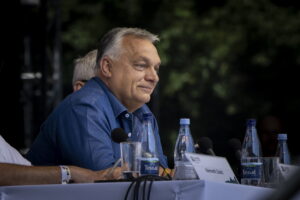
Critics question the objectivity of the Hungarian think tank as its connections to EU institutions draw scrutiny amid rising political tensions.Continue reading

Public opinion pollsters are under investigation by the Office for the Protection of Sovereignty. The 21 Research Center, IDEA Institute, Publicus, and Republikon: according to an investigation by the Office for the Protection of Sovereignty, these public opinion pollsters receive money from abroad and are part of a global political pressure network.
The Office for the Protection of Sovereignty (OPS) investigated the activities of organizations operating in Hungary that conduct public opinion polls. The investigation found that many public opinion polling companies have partners that are part of the global political pressure network previously uncovered by the office, and several of them have been proven to carry out foreign assignments, the organization said in a statement.
Public opinion polls are a fundamental element of democratic publicity and competition, they help voters to be informed freely and free from influence about the competition for election victory, and thus make decisions on election day, wrote the OPS. Falsified or fake public opinion poll results shared with the public, on the other hand, can distort citizen’s orientation. Such manipulative data disclosures can widely discredit methodologically sound research and contribute to the subsequent questioning of election results.
Manipulation in itself raises professional and moral concerns, and becomes a sovereignty issue when it is carried out on behalf of foreign funders,
they reported.
The Office for the Protection of Sovereignty has examined which Hungarian institutes receive foreign funds and, if applicable, which foreign actors they may have entered into a fiduciary relationship with. It is clear that the partners of the public opinion polling companies concerned are part of the global political pressure network previously uncovered by the Office.
For instance, among the foreign supporters of one of these pollsters, the 21 Research Center are, among others, the European Liberal Forum and the far-left German Marshall Fund, which, using their political influence and financial background, support projects dealing with social attitude research, political analysis, public opinion and market research in Hungary.
Another one, the IDEA Institute cooperates directly with the European Union and with organizations such as the American National Endowment for Democracy (NED) and the Rockefeller Brothers Fund. This cooperation clearly reflects the direct presence of foreign political and financial interests in the institute’s operations.
Furthermore, the Publicus Institute works in a wide-ranging foreign network with its domestic partners, thus directly receiving grants and application funds.
Republikon participates in European Union support programs and has also received direct funding from the Soros-led Open Society Policy Center and, previously, from the US Embassy in Budapest, led by former radical leftist activist ambassador, David Pressman.
Its significant foreign partners include the American German Marshall Fund, the National Democratic Institute (NDI) and the Rockefeller Brothers Fund. These relationships clearly reflect the organization’s international political embeddedness.
The OPS draws attention to the fact that if someone claims to be independent but publishes manipulative or false results, and uses foreign grants and resources for this purpose, they are essentially interfering in free elections. With their activities, they are deliberately misleading voters and providing a pretext for questioning the results of the elections. The extent of the damage is aggravated if this is done serially, in coordination with the media, as part of a disinformation campaign or action, the OPS concluded its report.

The Prime Minister seems to be unfazed by foreign funded polls. Photo: MTI/Miniszterelnöki Kommunikációs Főosztály/Fischer Zoltán
In the past year a number of such polls have been published in opposition media outlets, many of which also receive significant amount of foreign funding from organizations and bodies that are vocal critics of the government of Viktor Orbán. This has lead to accusations of polling manipulation, especially due to the fact, that these polls show Péter Magyar’s Tisza Party leading with over ten points over the governing FIDESZ. Despite such polls Magyar has only been able to draw a very small number of supporters for his ongoing country-wide tour.
In a recent statement, Viktor Orbán has said that his party’s internal polls show that the government coalition currently leads in 80 out of 106 electoral districts. Even recent polls commissioned by the largest opposition media outlet, Index.hu, show that Fidesz has a commanding lead in a number of contested electoral districts. The Prime Minister has called for elections at the earliest possible date in 2026, which is interpreted by most as a sign of confidence from his part. Hence the U.S.-, German- and EU-supported polling institution will continue to be under the crosshairs of the Hungarian public already weary of such interference ever since the last elections, where in 2022 similar polls have predicted a huge win for the opposition coalition. Viktor Orbán’s FIDESZ won by 20 percentage points.
Featured Image: Péter Magyar